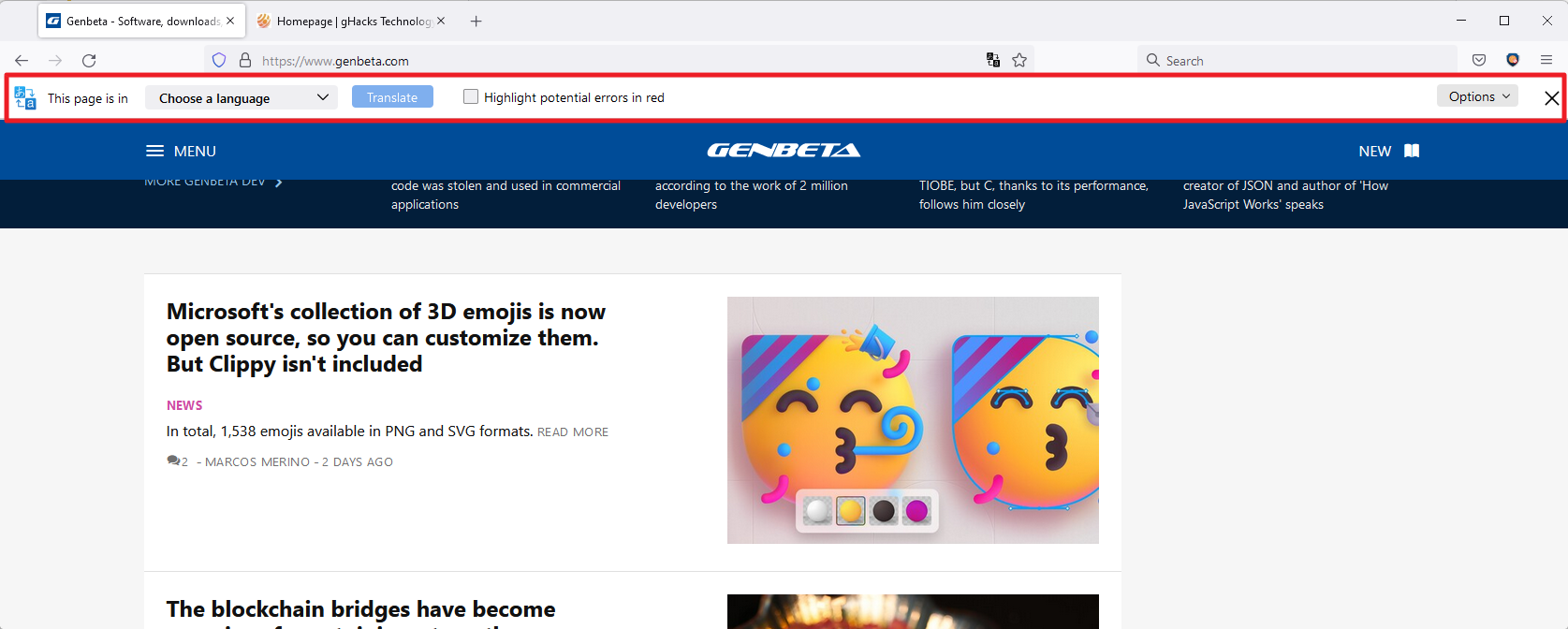Firefox Translations is a translation service for Firefox that Mozilla is working on currently. It is already available as a limited preview that supports a handful of languages and can be installed in any recent version of Firefox. What sets it apart is the fact that the translations happen locally on the user system, and not in the cloud.

At its core, Firefox Translations works similarly to how Chrome's Google Translate or Microsoft Edge's Bing Translate features work: when the user visits a foreign language website, as identified by the languages used on the system or in the browser, translate suggests to translate the content to the system language. When that happens in Chrome or Edge, data is submitted to servers that the companies operate. With Firefox Translations, no such data is submitted. Mozilla does not know the URL of the website, when you accessed it, your IP address, information about your system, or the information that the site contains.
Another difference between the two translations systems is that Firefox Translations needs to download language information the first time a language is selected for translation; this may be a bit inconvenient for users who have access to slow Internet connections only, but it is a one-time process for each language.
Firefox Translations is a game changer
Firefox Translations improves privacy significantly when using translate services. Vivaldi Browser offers the next best thing, by hosting translate servers that users of the browser use. While you could argue that this is not really that different from Google hosting its Translate servers, it is clear that both companies have a different stance on user privacy. Google is an advertising company first and foremost, and data is what increases the company's revenue.
Firefox Translations fills a feature gap in the Firefox browser. Translate functionality is important to many users, and Google's integration of Google Translate in Chrome was a game changer at the time. It improved translations by making them convenient in the browser. No longer was it necessary to install a browser extension or open a translate website manually to get a translated version of a site.
Mozilla's service is a work in progress, and there are several restrictions and limitations currently that hold it back. If Mozilla manages to address these, Firefox Translations could very well become another game changer when it comes to in-browser translations.
The ifs...
Language support is still a work in progress; this is without a doubt the main limitation right now. Firefox Translations supports a dozen or so languages, including English, French, Spanish, German and several others, but it lacks support for hundreds of others, not even counting languages such as Klingon or Borg. It takes time to get support added for these, which, in the meantime, limits the reach of Firefox Translations.
Firefox integration is provided via a browser extension currently. Native support improves the usability, as translate functionality is built-in then and not dependent on the installation of a browser extension. To compete with Chrome's translate service, Firefox Translations needs to become a native feature of Firefox.
Translation options need an option to always translate a particular language; this does not seem to be supported at the time. While users may select the "never translate language" option, no such option to always translate a specific language or site is provided.
Last but not least, there needs to be an option to translate specific text parts such as a paragraph or a sentence.
Closing Words
Firefox Translations is a huge undertaking that improves Firefox already and will improve Firefox for lots of users in the future. Time is an issue, as language support is lacking and needs to expand. While Mozilla is working on that, the organization can't afford to continue working on the service for several years before it is ready to compete with the cloud-based translation services in regards to language support.
Several Chromium-based browser makers may be interested in Firefox Translations. Brave Software, for instance, decided against integrating Google Translate natively in the browser. It displays a prompt to users to install Google Translate, but that has privacy implications and reduced functionality when compared to Chrome's native offering. It is unclear if these companies could integrate Firefox Translations in their browsers.
Now You: what is your take on Firefox Translations?



3175x175(CURRENT).thumb.jpg.b05acc060982b36f5891ba728e6d953c.jpg)


Recommended Comments
Join the conversation
You can post now and register later. If you have an account, sign in now to post with your account.
Note: Your post will require moderator approval before it will be visible.